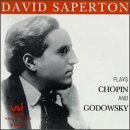| All Artists: Frederic Chopin, Leopold Godowsky, Isaac Albeniz, David Saperton Title: David Saperton Plays Chopin and Godowsky Members Wishing: 0 Total Copies: 0 Label: Video Artists Int'l Release Date: 11/6/1995 Genres: Special Interest, Classical Styles: Exercise, Chamber Music, Historical Periods, Classical (c.1770-1830), Modern, 20th, & 21st Century Number of Discs: 2 SwapaCD Credits: 2 UPC: 089948103721 |
Search - Frederic Chopin, Leopold Godowsky, Isaac Albeniz :: David Saperton Plays Chopin and Godowsky
 | Frederic Chopin, Leopold Godowsky, Isaac Albeniz David Saperton Plays Chopin and Godowsky Genres: Special Interest, Classical
|
Larger Image |
CD Details |
CD ReviewsExcellent, although old recording! 11/29/1998 (4 out of 5 stars) "Played by David Saperton, son-in-law of Leopold Godowsky, these recordings give an insight into the masterpieces of Godowsky as few have done even now. Especially good to hear is the Symphonic Metamorphoses of the Strauss waltzes. The quality of play on these pieces is better than both Earl Wild and Rian de Waal. The album is worth buying for both its historical value (Saperton was a teacher of Abbey Simon and Jorge Bolet), as well as the excellent performance of the Godowsky works." AMAZING RECORDINGS Alexandre A. G. Salva | Salto, SP Brazil | 07/24/2003 (5 out of 5 stars) "There are few recordings of Chopin's Etudes that are really good: NOVAES, POLLINI, ARRAU and WILD are on the top. Unfortunatelly, there are not the complete set with Rubinstein... David SAPERTON plays the Etudes Op 10 & 25 like a Master. The second one from Opus 10 is unbelievable. The other recordings are great too, specially Godowsky's transcriptions. SAPERTON was a legendary pianist, as Godowsky, Horowitz, Rachmaninoff and Hofmann. It is a CD set to any good collection. It is a pleasure to listen to these amazing recordings." The greatest piano technique on recording Joseph L. Renouf | Connecticut | 11/01/2007 (5 out of 5 stars) "This recording is a glimmer into piano playing's past, one filled with keyboard giants, redwood trees, not the puny, the indistinguishable, the faceless drones of today's mechanized generation that churns out pianists from the assembly line. Saperton's name deserves a place among the most celebrated legends of the past -- Rachmaninoff, Cortot, Rosenthal, Friedman, Hofmann, Lhevinne -- those, in short, who "knew no difficulties."
And unlike most other greats (I would give anything to hear one of Rachmaninoff's etudes), Saperton has given us a complete set of Chopin's pianistic bible, one unparalleled in elegance, clarity, freedom of rubato, pure pianism. It may not always have the depth and devil-may-care romantic abandonment of Cortot's set, but Saperton's phrasing, voicing, pedaling, clarity, and lightness are from another world entirely, Cortot takes us to the limits of HUMAN experiences, telling of military conquests, forbidden amorous encounters, midnight rides, but Saperton transcends, elevating our senses to where live the sprites and will-o'-the-wisps, into the ethereal mists, beyond the turmoil and bloodshed of a fallen race. This is the beauty of sound itself. If the gods could breathe music into our ears while we sleep, they would chant such sounds. But oh, what a tragedy that Saperton has left us only this one record of his genius! After all, he had recorded all 53 Godowsky studies on the Chopin etudes, many of which were lost in the melting-down for the war effort. Each one of the 11 on this disc is a marvel in polyphonic playing, a transcendental realization of Godowsky's wayward salon harmonies. Listen especially to the otherworldly flight of Saperton's fingers in the "Ignis Fatuus" based on the chromatic etude, or the final recrafting of the melody in the second nouvelle etude, played with a trailing rubato into a smorzando. And as for the etudes themselves, we have never, and it goes without saying, will never, hear the like of this technique again -- not in performance, not on recording, nowhere. Even Lhevinne and Friedman would have had to bow their heads in awe at Saperton's double thirds -- the precision of touch, the suppleness, the dynamic contrasts (note the double passage in descending lateral motion thirds). And Cortot's comment about the importance of the French jeux perle touch in the black key etude is best exemplified by Saperton's pearly touch. The Winter Wind etude bites and hisses (with a climactic double-octave return to the main theme), having more fire than Lhevinne's more orchestral rendering. The Revolutionary, pallid and hackneyed in the hands of a Perahia, crude when pounded out by a hairy caveman like Gavrilov, becomes a perfect blend of dexterity and passion with Saperton, whose left hand is played with the charging energy of cavalry sharply contrasted against the cries of the multitude in the treble. Chopin would have liked Saperton, and the misanthropic Pole didn't like much. Listen, and you'll hear elegance at its highest level, the way Chopin was meant to be played. Saperton cannot be overlooked by anyone who claims knowledge about the piano. The day will come, whether in this life or the next, when he is crowned with laurels for his achievements. --Joseph Renouf " |

 Track Listings (27) - Disc #1
Track Listings (27) - Disc #1